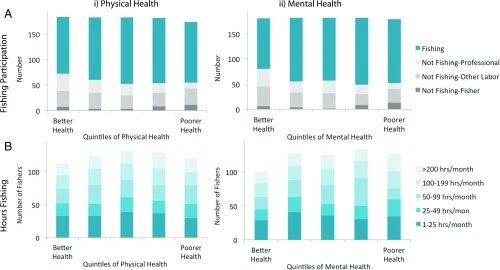Fig. 2.
For men (n = 253) facing markedly different levels of illness, we observe that (A) fishing participation is widespread; individuals not fishing are largely employed in other sectors, whereas a smaller number of fishers who experience poor health are not fishing. (B) Fishing effort, measured as hours fishing, is relatively stable across experiences of (i) physical health and (ii) mental health. Individual experience of poorer health (moving to the right on each graph) is assessed in multivariate panel regression models. Models show that mental and physical health did not affect participation in fishing, hours fished, nights spent away from home, or income earned per hour and had a modest effect on hours traveled (Tables S4 and S5).

